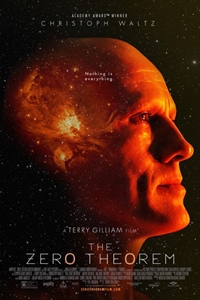The Zero Theorem (R) ★★★
 Mad and scattered though it may be, The Zero Theorem feels like business as usual for Terry Gilliam. If you've seen what the visionary filmmaker can do with emotional chaos, fantastical concepts, and corporate dystopias in the Fisher King, Twelve Monkeys, and Brazils of cinema past, then you'll find this latest venture to be less a new exploration of Gilliam's yet untapped imaginings and more a 'Best Of' reel honoring his greatest cinematic elements to date. In short, while amply pleasant, Zero Theorem is nothing new for the director.
Mad and scattered though it may be, The Zero Theorem feels like business as usual for Terry Gilliam. If you've seen what the visionary filmmaker can do with emotional chaos, fantastical concepts, and corporate dystopias in the Fisher King, Twelve Monkeys, and Brazils of cinema past, then you'll find this latest venture to be less a new exploration of Gilliam's yet untapped imaginings and more a 'Best Of' reel honoring his greatest cinematic elements to date. In short, while amply pleasant, Zero Theorem is nothing new for the director.
That Gilliam's adherence to the visual penmanship that has carried with him for decades has become "pleasant" - perish the thought: comfortable - might be its biggest fault. The dynamic "new"-ness of the aesthetic and rhythm in his early features is what made it so compelling a style. Showing little evolution in Zero Theorem, and perhaps even the hint - via a few cloyingly unoriginal sci-fi constructs, like a personalized video advertisement that follows Christoph Waltz down the street - that Gilliam has fallen behind the times in his sociopolitical commentary.
It's a horrifying notion that Zero Theorem might be an act of regression for Gilliam (even after a decade of critical maligned work), and one that reverberates as we feel Waltz's turn as a gifted recluse awaiting tell of the meaning of life amount to little more than cuteness. Alongside him are players equally limited by the fluffy nature of the piece: Melanie Thierry as a batty woman who takes a liking to Waltz's Qohen, David Thewlis as his troublesome and inept supervisor, Lucas Hedges as a technical prodigy and petulant teen in whom Qohen finds an unwanted sidekick… oh, and a white-haired Matt Damon as "The Management." Just as the members of Zero Theorem's Orwellian society are accused of being, each of the film's players amounts more or less to a tool, a cog in a competent but hardly challenging machine.
The script is no more or less inspiring, just another vehicle to get Gilliam's wildfire set piece construction and gallant metaphysical ideology running again. It's all lovely, funny, and an entirely nice way to spend two hours. But it's hardly the sort of work the director was once assured to deliver.
To get the full Quicklook Films experience, uncheck "Enable on this Site" from Adblock Plus
box office top 10

Civil War Released: April 12, 2024 Cast: Kirsten Dunst, Wagner Moura 11.1M

Abigail Released: April 19, 2024 Cast: Melissa Barrera, Dan Stevens 10.2M

Godzilla x Kong: The New Empire Released: March 29, 2024 Cast: Rebecca Hall, Brian Tyree Henry 9.5M

The Ministry of Ungentlemanly Warfare Released: April 19, 2024 Cast: Henry Cavill, Eiza Gonzalez 9M

Spy x Family Code: White Released: April 19, 2024 Cast: Takuya Eguchi, Saori Hayami 4.9M

Kung Fu Panda 4 Released: March 8, 2024 Cast: Jack Black, Viola Davis 4.6M

Ghostbusters: Frozen Empire Released: March 22, 2024 Cast: Paul Rudd, Carrie Coon 4.4M

Dune: Part Two Released: March 1, 2024 Cast: Timothée Chalamet, Rebecca Ferguson 2.9M

Monkey Man Released: April 5, 2024 Cast: Dev Patel, Sikandar Kher 2.2M

The First Omen Released: April 5, 2024 Cast: Nell Tiger Free, Bill Nighy 1.7M






